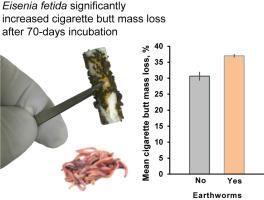Soil Biology and Biochemistry ( IF 9.8 ) Pub Date : 2020-09-30 , DOI: 10.1016/j.soilbio.2020.108022 Daniil I. Korobushkin , Petr G. Garibian , Lyubov A. Pelgunova , Andrey S. Zaitsev

|
Cigarette butts (CBs) represent the most common, though poorly biodegradable, type of waste on Earth. Thrown on the soil surface, they can remain unchanged for years, poisoning surrounding ecosystems with toxins accumulated during the smoking process. However, there is practically no data on the effect of smoked CBs on soil biota or soil animals in particular, nor on the potential of edaphic fauna to facilitate their decomposition. One of the most promising agents among soil animals are earthworms, which are known to be beneficial in the processes of recalcitrant organic matter degradation and stimulation of microbial activity in detrital food webs. In a microcosm experiment with the sod podzolic soil, we aimed at testing the effect of the commonly cultured epigeic earthworm Eisenia fetida (Savigny 1826) on the biodegradation rate of CBs and the possible adverse effects of this waste on the species. The experiment had a full-factorial design with three categorical predictors: CB number (0, 1 and 3 per microcosm); smoking condition (smoked and unsmoked CBs) and two levels of earthworm amendment (0 and 4 per microcosm). During 70 days of the experiment, we did not observe any smoked CB-induced mortality of earthworms. The addition of E. fetida significantly increased the CB mass loss across all treatment combinations. Specifically, earthworms improved the decomposition rate from 30 to 36% (p < 0.05), on average. However, this improvement was mainly associated with CB paper wrapping consumption. The inhibition of CO2 emission in microcosms with CBs and earthworms suggested the direct consumption of this waste by E. fetida, rather than modulation of the degradation potential of a microbial community. E. fetida appears to thus be a moderately promising agent for CB biodegradation with the simultaneous reduction in carbon loss from soil through the microbial channel in the studied soil type. These results open perspectives for the further evaluation of the role of soil macroinvertebrates in recalcitrant organic waste management in general and CBs in particular.
Summary
We demonstrated that earthworms can efficiently decompose smoked and unsmoked cigarette butts regardless of their toxic potential and simultaneously reduce associated microbial activity.
中文翻译:

蚯蚓物种蚯蚓加速烟头的土壤表面上的分解速度
烟头(CBs)是地球上最常见但可生物降解的废物。它们被扔在土壤表面,可以保持多年不变,并通过吸烟过程中积累的毒素毒害周围的生态系统。但是,实际上,没有关于熏制CB对土壤生物或土壤动物的影响的数据,也没有关于食用动物促进其分解的潜力的数据。soil是土壤动物中最有前途的药物之一,earth在破坏性食物网中顽固的有机物降解和刺激微生物活性的过程中是有益的。在草皮坡地土壤的缩影实验中,我们旨在测试常用的附生epiEisenia fetida的效果(Savigny 1826)研究了CBs的生物降解率以及这种废物对物种的可能不利影响。该实验采用全要素设计,具有三个类别的预测指标:CB编号(每个缩影分别为0、1和3);吸烟条件(熏制和未熏制的CB)和two修正的两个级别(每个缩影分别为0和4)。在实验的70天内,我们没有观察到任何烟熏CB诱导的mortality致死率。在所有治疗组合中,添加的大肠杆菌均显着增加了CB质量损失。具体而言,earth将分解率平均提高了30%至36%(p <0.05)。但是,这种改善主要与CB纸的包装消耗有关。抑制CO 2含CB和earth的微观世界中的排放表明,埃希菌直接消耗了这些废物,而不是调节了微生物群落的降解潜力。因此,在研究的土壤类型中,fetida大肠杆菌似乎是CB生物降解的中等前景剂,同时减少了通过微生物通道从土壤中损失的碳。这些结果为进一步评估土壤无脊椎动物在一般顽固有机废物管理中的作用开辟了前景。
概要
我们证明了worm可以有效分解烟熏和未烟熏的烟头,无论其潜在的毒性如何,同时还能降低相关的微生物活性。











































 京公网安备 11010802027423号
京公网安备 11010802027423号